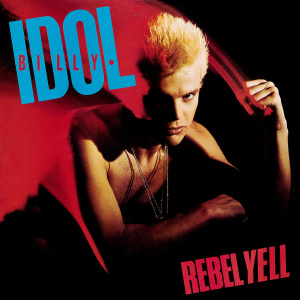
Rebel Yell is the second studio album by the English rock singer Billy Idol, released on 10 November 1983 by Chrysalis Records. After the release of his 1982 eponymous debut studio album, Idol continued his collaboration with producer Keith Forsey and multi-instrumentalist Steve Stevens. The album was recorded at Electric Lady Studios in New York. Initially recording without a drummer, utilizing only the electronic drum machines LinnDrum and Roland TR-808, Forsey and Stevens later decided to hire Thommy Price to play drums on some of the songs. Musically, Rebel Yell is a new wave album with strong pop rock and hard rock influences. The cover sleeve and images were shot by Brian Griffin. Idol got the idea of the album's title after attending a party with the Rolling Stones and drinking Rebel Yell bourbon whiskey.
Speed is the rate of motion, change, or activity.

Idol Songs: 11 of the Best is a greatest hits album by English rock singer Billy Idol, released on 20 June 1988 by Chrysalis Records. It comprises all the singles released from his first three studio albums—Billy Idol, Rebel Yell and Whiplash Smile—as well as the live version of "Mony Mony" and re-recorded Generation X song "Dancing with Myself", both of which appeared on Idol's debut EP Don't Stop. A limited edition of the album contains two extra remixes, and another limited edition contains four extra remixes. The album reached number two on the UK Albums Chart and has been certified platinum by the British Phonographic Industry (BPI). In 2003, the album was reissued with a different title and cover as The Essential.

"White Wedding" is a song by Billy Idol that was released as the second single from his self-titled studio album in 1982. Although not Idol's highest-charting hit, it is often considered one of his most recognizable songs. In the US, it peaked at No. 10 on the Billboard Bubbling Under the Hot 100 chart on 27 November 1982, then reached No. 36 on the Billboard Hot 100 on 2 July 1983 after it was re-issued. In the UK, it reached No. 6 in the UK Singles Chart upon its re-release there in 1985, when it was re-issued to promote the Vital Idol remix album.
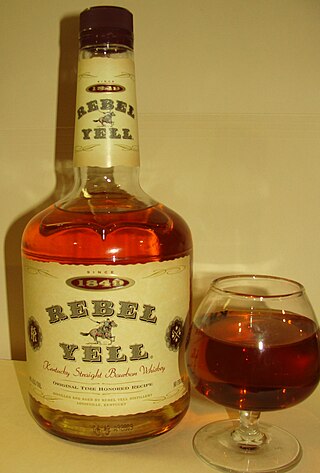
Rebel, formerly Rebel Yell until 2020, is a brand of Kentucky straight bourbon whiskey owned and marketed by MGP Ingredients. Rebel Yell is currently distilled and aged at the Lux Row Distillery, in Bardstown, Kentucky, which opened in 2018. As is typical for a bourbon, it is sold at 40% alcohol by volume. Before the opening of the Lux Row Distillery, the brand was produced under contract by Heaven Hill at its Bernheim distillery in Louisville.
Lakeside Amusement Park was an amusement park located in Salem, Virginia, neighboring Roanoke, at the intersection of U.S. Route 460 and State Route 419. The park was named after a very large swimming pool which was opened on the site in 1920. The pool was surrounded by a beach and quickly became a favorite summer retreat for residents of Roanoke and Salem. Amusement park rides were added to the facility within a few years of its opening. The park also included a pavilion, which hosted celebrity concerts. Frequent performers included country artists Tom T. Hall and Conway Twitty.
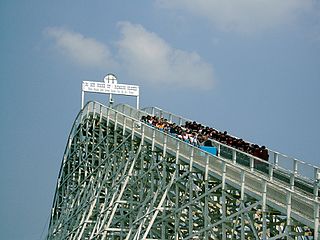
Racer 75 is a wooden racing roller coaster at Kings Dominion in Doswell, Virginia. Designed by John C. Allen, the ride opened with the park in 1975 as Rebel Yell. It features a similar track layout to The Racer (1972) at Kings Island and the now-defunct Thunder Road at Carowinds (1976). In 2018, Rebel Yell was renamed Racer 75, dropping its former name’s connection to the Confederacy to represent its racing layout and opening year, as well as a subtle nod to the American Coaster Enthusiasts (ACE) organization that was founded in 1978.

"Eyes Without a Face" is a song by English rock musician Billy Idol, from his second album Rebel Yell (1983). It was released in June 1984 as the second single from the album. The song is softer and more ballad-like than most of the album's other singles. It reached No. 4 on the Billboard Hot 100, becoming Idol's first top-10 hit in the US. The recording features the voice of Perri Lister—she appeared in the banned video for "Hot in the City"—who sings "Les yeux sans visage" as a background chorus. The title of the song refers to the English title of French director Georges Franju's 1960 film Les yeux sans visage.
Blue Highway may refer to:

No Time to Chill is the fifth studio album by German band Scooter. It was released on 20 July 1998. It contains three singles, "How Much Is the Fish?", "We Are the Greatest/I Was Made for Lovin' You" and "Call Me Mañana". It is the first album featuring Axel Coon.

Our Happy Hardcore is the second studio album by German dance group Scooter. The European release date for the album was 28 March 1996. Three singles were released from the album, starting with "Back in the U.K." in November 1995 and "Let Me Be Your Valentine" in February 1996. The final single, a cover version of the Billy Idol song "Rebel Yell", followed in May 1996. The mostly instrumental "Crank It Up" is notable for its use as the theme tune for the Bruno segments in Da Ali G Show.

"Rebel Yell" is a song by English-American rock musician Billy Idol. It is the title track of his 1983 album of the same name, and was released as the album's lead single in October 1983. Although it charted outside the UK Top 40, a 1985 re-issue peaked at no. 6, and it reached no. 46 in the US. The song received wide critical acclaim and in 2009 was named the 79th best hard rock song of all time by VH1 based on a public vote.
Keith Forsey is an English pop musician and record producer.
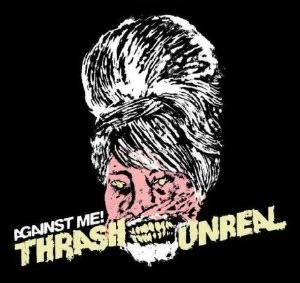
"Thrash Unreal" is a single by punk group Against Me!. It is the second single from their album New Wave. It was their first single to chart in the United States, hitting #11 on Billboard's Alternative Songs chart, becoming their highest-charting song. The title of the song was coined by the album's producer, Butch Vig. It was also released as a downloadable track for the Rock Band video game series on March 17, 2009.

William Michael Albert Broad, known professionally as Billy Idol, is a British and American singer, songwriter, musician and actor. He first achieved fame in the 1970s emerging from the London punk rock scene as the lead singer of the group Generation X. Subsequently, he embarked on a solo career which led to international recognition and made Idol a lead artist during the MTV-driven "Second British Invasion" in the US. The name "Billy Idol" was inspired by a schoolteacher's description of him as "idle".

"Sweet Sixteen" is a song by British singer-songwriter Billy Idol, released in 1987 as the third single from his third studio album Whiplash Smile (1986). The song written by Idol and produced by Keith Forsey. "Sweet Sixteen" peaked at No. 20 in the US and No. 17 in the UK. It was also a hit across Europe and beyond.

"Speed" is a song by British singer-songwriter Billy Idol, originally included in the soundtrack of the eponymous film. It was written by himself and by guitarist Steve Stevens, and released in August 1994 as the film's main song through Arista Records worldwide and Chrysalis Records in the United States.

"Flesh for Fantasy" is a song by Billy Idol from his 1983 studio album Rebel Yell. It became the album's third single, and was a #29 hit in the United States on the Billboard Hot 100 charts in 1984.
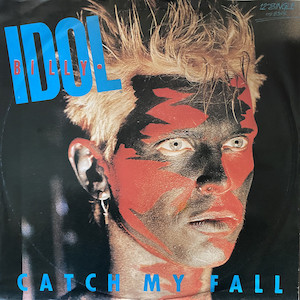
"Catch My Fall" is a song by Billy Idol from his 1983 studio album Rebel Yell. It became the album's fourth and final single. It was written by Idol and produced by Keith Forsey.














